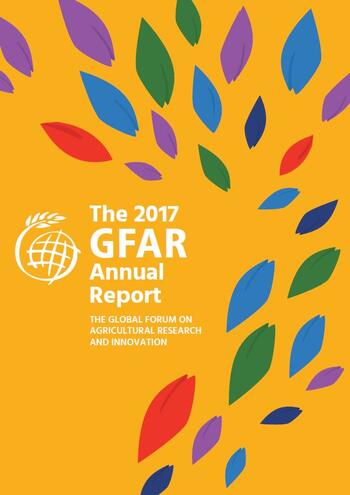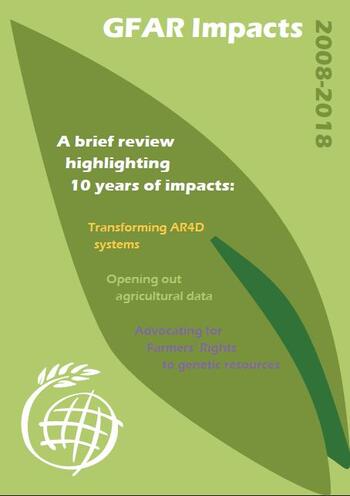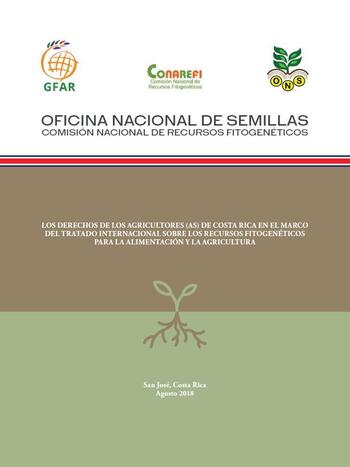GFAR was initially conceived in 1996 as an association of public research organizations, working together with representatives of other stakeholders, to reshape and strengthen national agricultural research systems and to promote research on key themes for greater development impact. Times have changed and the Global Forum has evolved greatly over the last decade, as members have worked together to reshape agricultural research and innovation towards the UN Sustainable Development Goals (SDGs).
Truly sustainable agricultural development, and empowering rural communities to realize their desired futures, require the actions and interactions of many actors and the flow of knowledge and ideas in many directions. In reality, innovation is not a linear process but operates through complex webs. Partners in GFAR hence conceive farmers and rural communities as central and integral to all processes of innovation, rather than at the end of a supposed pipeline from research. Reflecting this reality, GFAR has now been completely restructured through a consultative process of governance reform, creating a unique, open and equitable mechanism for participatory dialogue, collective action and advocacy, to transform and strengthen the roles of agri-food research and innovation in development. GFAR is a collective movement, an action network made up of hundreds of self-committing organizations, themselves setting the agenda, linking science and society and working together to change the dynamics of agri-food research and innovation systems, processes and business models.
This report highlights the changes achieved and the exciting new basis of GFAR. The new governance of GFAR brings together, on an equal basis, all 13 sectors active in shaping agricultural research and innovation around the world, from across public, private and civil society sectors, nationally and internationally. These Steering Committee members are determined either as the elected heads of relevant sectoral networks, or, in the case of grassroots organizations, directly elected by the GFAR Partners within that sector. This balance of international organizations, providing the global presence of GFAR, with grassroots organizations that keep the focus very grounded on real needs and real challenges, is a unique strength of GFAR and is now inspiring similar change in partner organizations and networks.
GFAR’s work reflects this multi-stakeholder governance and is expressed through collective actions, determined and driven by the partner organizations themselves, supported by the GFAR Secretariat. GFAR is a leading-edge organization for the future; an institution without walls that celebrates and recognizes the contributions of our constituent organizations towards development objectives, yet also adds a vital dimension: fostering partnership and synergies among these partners to achieve far more change and impact than any one organization or sector can achieve by itself. Some examples are presented in this report, including work to strengthen smallholder farmers’ rights to information and genetic resources, use of participatory foresight and development of innovation platforms to rapidly and sustainably develop new business opportunity for youth and actions to transform the university experience and ensure tomorrow’s leaders are equipped with the personal and professional skills required to really make a difference. Alongside these, GFAR continues to help inspire and enable change in its constituent networks themselves, from local to regional and international, helping organizations to reflect on their own roles and values and how they can better serve the needs of millions of the world’s poor.
GFAR is a unique bridge linking science and society and is needed now more than ever. Together, we are tackling the unspoken ‘elephants in the room’ that constrain agri-food knowledge and innovation from benefiting those they are intended to serve; the world’s poor farmers and consumers. By fostering real partnership, common advocacy and collective actions, we are opening out institutionalized silos and breaking down barriers between diverse actors, all of whom are essential to achieving truly sustainable development. With a reformed governance and a newly elected Chair, Bongiwe Njobe, and Vice-Chair, Raffaele Maiorano, GFAR is well placed to drive change in agri-food innovation systems around the world over the years ahead and give rural communities the exciting future they deserve. As this report shows, GFAR is a collective movement that is learning all the time, about what it takes to build consensus and collective action among widely diverse partners and about how Partners can best own these changes themselves and bring change right through to local impacts, if the SDGs are indeed to be met by 2030.
This document has been produced with the financial assistance of the European Union. The views expressed herein can in no way be taken to reflect the official opinion of the European Union.
Citation:
GFAR (2018) GFAR Annual Report 2017. Global Forum on Agricultural Research and Innovation, Rome, Italy.
@ 2018. GFAR. All rights reserved. This publication may be reproduced without the permission of, but with acknowledgement to, the Global Forum on Agricultural Research and Innovation.
Layout and design:
Skiprock Creative
Writing and editing:
Charles Plummer

A brief review highlighting 10 years of GFAR's impacts in:
- Transforming AR4D systems
- Opening out agricultural data
- Advocating for Farmers’ Rights to genetic resources

Este material de capacitación y divulgación se deriva de las recomendaciones formuladas en la Primera Reunión Nacional de Derechos de los Agricultores celebrada en Costa Rica, organizada por la Oficina Nacional de Semillas y la Mesa Nacional Campesina y facilitada por la Secretaría del GFAR, el Programa de Pequeñas Donaciones del PNUD-GEF y la FAO Costa Rica. El material fue desarrollado por la Comisión Nacional de Recursos Fitogenéticos de Costa Rica y otras partes interesadas, incluidas las organizaciones de agricultores.
El documento está en idioma español.
***
This capacity building material arises from recommendations made at the First National Meeting of Farmers' Rights held in Costa Rica, organized by the National Seed Office and the Mesa Nacional Campesina, and facilitated by GFAR Secretariat, UNDP-GEF Small Grant Programme and FAO Costa Rica. The capacity building material was developed by the National Commission on Plant Genetic Resources of Costa Rica and other stakeholders, including farmers' organizations.
The document is in the Spanish language.

Wecome to the GFAR Update! This is our first newsletter of the New Year, packed with news from GFAR Secretariat and Partners from 4th quarter 2018. You can also find selections from the latest Partner Spotlights, and upcoming events and opportunities.
But first, a personal message from Dr. Mark Holderness, whose term as GFAR Executive Secretary has ended on December 31st, in line with the GFAR Charter. Read his reflection on his 11 years of service and his wishes for the continuing work of GFAR:
Dear Colleagues, Partners, Friends and Family,
My term as GFAR Executive Secretary has now come to an end, in line with the GFAR Charter. It has been an amazing journey and together we have really made a difference in transforming agri-food research and innovation to better meet the Sustainable Development Goals, with smallholder farmers and rural communities at the centre of such processes.
My heartfelt thanks to the wonderful Secretariat team; to all those who have been involved in GFAR's governance and management over the last decade; to FAO, IFAD, EU, CGIAR and our other funders for their invaluable support over the years; to the 620+ Partner organisations in GFAR, who have put their differences aside and worked together in such exciting new ways; and to my family for putting up with so much over the years.
It's onto new things for me and seeking new challenges, but I certainly aim to take forward GFAR's vital principles into new forms and applications, wherever they may be needed. GFAR of course continues to go forward, with a new Executive Secretary now being recruited, a new phase of collective actions and as important a job to do as ever.
I wish you all every success in these endeavours.
Sincerely,
Mark Holderness
Read more about Dr. Holderness' leadership of GFAR in the blog post below, and catch up on what GFAR and Partners have been doing. If you missed it, you can also check out the 2017 GFAR Annual Report HERE!
